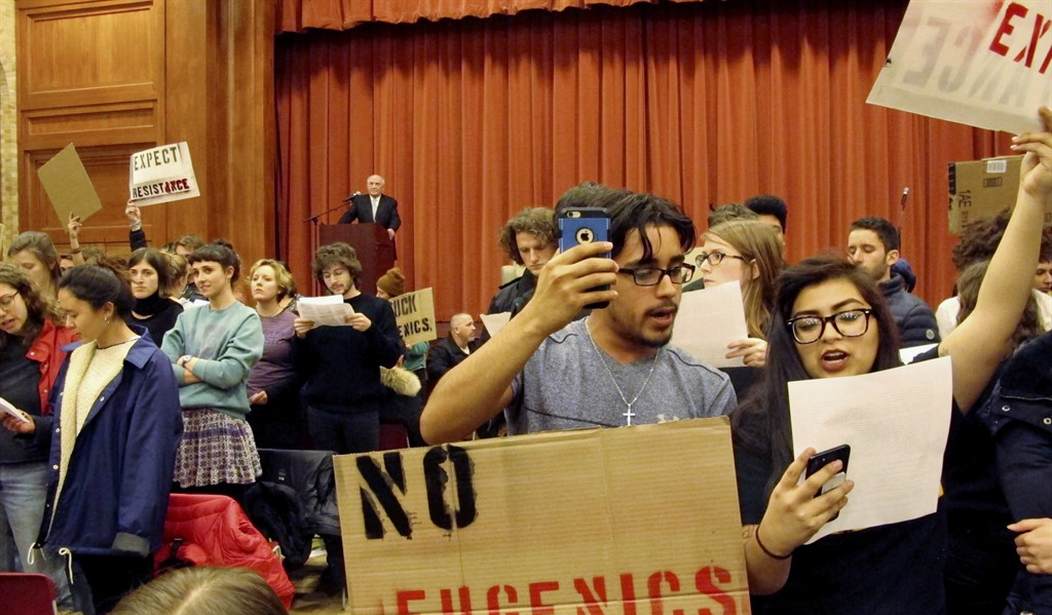Middlebury College, a symbol of violent rioting in the name of tolerance, is easy to scorn and disdain. Nice boys and girls -- sons and daughters of nice moms and dads -- get caught acting out on intolerant impulses, and a "disturbance" sends a professor to the hospital. (At the University of Mississippi, this would be called a riot.)
Middlebury is nestled on 350 bucolic acres in the Champlain Valley of Vermont, and the college webpage says all the right things about being welcoming and diverse, and showing respect and resilience to differing viewpoints in order to train "thoughtful and ethical leaders able to meet the challenges of informed citizenship."
But citizenship and challenges ain't what they used to be, neither in the groves of academe nor in the culture in which we all live. Student riots are not new, of course (almost nothing is). In the Middle Ages, adolescent boys in England and Europe banged their mugs of ale on mess hall tables and repaired in the streets of the town to break things and teach the unwashed townies a thing or two about civilized behavior.
What is new is that the rack and rumpus today is backed by a perverse sense of moral superiority, a pampered and polarized perception of how to think about right and wrong, which becomes the intellectual equivalent of Tarzan's "me good; you bad." Laurie L. Patton, the president of Middlebury College, was no doubt sincere in saying that the rioters on her campus, demonstrating deep and troubling divisions, "failed to live up to our core values." Mobs rarely live up to such values. Nevertheless, the rioting students accurately reflected the deep and troubling divisions in the culture at large.
Recommended
Charles Murray wrote some things about ethnic differences and what to make of them that the students probably never read but nonetheless didn't like. Though taught to argue and debate in a reasonable way, they turned to righteous violence. Middlebury is an elite campus: The students' SAT scores rank in the 96th percentile, and the annual cost can run up to $65,000. U.S. News & World Report ranks it No. 4 among the nation's liberal arts schools. Such students shouldn't have to break somebody's head to make an intellectual point.
The phrase "political correctness" has been flattened to a cliche, but it demonstrates the left vs. right mindset that illustrates the right and wrong way to think on elite campuses like Middlebury. It's difficult to break through with facts that question dogma and polarized prejudice.
Prejudice on the left is reinforced by the celebrity pop culture. What's said is regarded as morally superior, and a different opinion is not disdained as ugly but, worse, as unfashionable. Madonna reprises her participation in the Women's March on Washington as bravery in "a new age of tyranny." She shows herself in a black-and-white video preparing for battle in fascist chic. To make everyone understand that she's on the side of the angels, angel wings sprout from her back as a severed noose hangs round her neck.
Too bad there was no angel to rescue Allison Stanger, the political science professor at Middlebury who tried to moderate Murray's campus appearance and landed in the hospital. She made her fashion statement with a neck brace.
Responses to the Middlebury mob have been as partisan as the protests. D.D. Guttenplan, editor at large of the reliably leftist The Nation magazine, is upset not so much by the silencing of free speech at Middlebury, as bad as it was, but the fact that the silencing plays "into a narrative that depicts college students in general -- and liberal campuses in particular -- as privileged enclaves filled with spoiled, out-of-touch, intolerant 'snowflakes' more concerned with maintaining their own ideological cocoons than with making change in the real world. ... You don't need to be a free-speech absolutist to see that allowing a mob to veto unpopular ideas is a weapon that can all too easily be turned against progressive causes -- especially in Trump's America." (So that's the reason to oppose a mob of progressive/liberal students.)
Some conservative commentators blame the teaching of Herbert Marcuse, a Marxist philosopher fashionable on campus in the '60s. His books are in vogue again in defense of "discriminating tolerance," the idea that it's OK to be tolerant of intolerance. As a free-speech denier, Marcuse says it's necessary to repress conservative ideas because they move toward, well, repression.
A philosopher with something actually pertinent to apply is John Stuart Mill. "He who knows only his own side of the case," he wrote in his 19th-century essay on liberty, "knows little of that." But what could a dead white man know?

























Join the conversation as a VIP Member